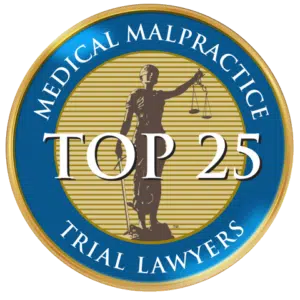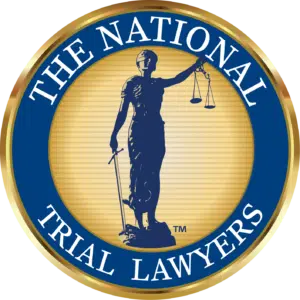At the Law Offices of Judy Greenwood we are a family firm of caring lawyers in Philadelphia and Pennsylvania who have handled all types of serious medical malpractice and medical negligence cases involving doctor, nursing, and hospital mistakes for over 40 years. Because these medical malpractice cases are often complex our legal team has access to medical and nursing experts, and a doctor lawyer who has been available to review the facts of your case and provide the medical insight necessary to determine if there was negligence or substandard care. Let our injury lawyers help you in your case.
Lawyers who will fight for you and have your back

US News & World Report Best Lawyer
Top 25 National Women’s Trial Lawyer
AV Preeminent Lawyers

US News & World Report Best Lawyer
National Trial Lawyers Top 100 Lawyer
AV Preeminent Lawyers
Philadelphia - including South Philadelphia • Southwest Philadelphia •West Philadelphia•Lower North Philadelphia•Upper North Philadelphia•Roxborough-Manayunk•Germantown-Chestnut Hill•Olney-Oak Lane•RiverWards•Near Northeast Philadelphia•Far Northeast Philadelphia.
Abington •Ambler Arcola • Audubon • Bala Cynwyd • Blue Bell • Bridgeport• Broad Axe• Bryn Athyn •Cedars •Center Square • Cheltenham •Collegeville • Colmar•Conshohocken Creamery•Dresher•Eagleville•Earlington•East Greenville•East Norriton•Elkins Park•Erdenheim•Fairview Village•Flourtown•Fort Washington•Foxcroft Square• Franconia•Frederick•Gilbertsville•Gladwyne•Glenside•Graterford•Green Lane•Gulph Mills•Gwynedd•Gwynedd Valley•Harleysville•Hatboro•Hatfield•Horsham•Huntingdon Valley•Jenkintown•King of Prussia•Kulpsville• Lafayette Hill•Lansdale•Lederach•Limerick•Lower Gwynedd•Lower Pottsgrove Township•Mainland•Maple Glen• Meadowbrook•Merion•Merion Station•Miquon•Mont Clare•Montgomeryville•Narberth•New Hanover•Norristown• North Hills•North Wales•Oaks•Ogontz Campus•Oreland•Palm•Penllyn•Pennsburg•Perkiomenville•Phoenixville• Plymouth Meeting•Plymouth Township•Pottstown•Red Hill•Rockledge•Roslyn•Royersford•Rydal•Salford• Salfordville•Sanatoga•Sassamansville•Schuylkill Township•Schwenksville•Skippack•Souderton•Spring House• Spring Mount•Springfield Township•Springhouse•Stowe•Sumneytown•Telford•Trappe•Tylersport•Upper Dublin• Upper Merion Township•Upper Moreland Township•Upper Pottsgrove Township•West Conshohocken•West Point• Whitemarsh Township•Willow Grove•Worcester•Woxall•Wyncote•Wyndmoor•Wynnewood•Zieglerville.
Aldan, Ardmore, Aston, Boothwyn, Brookhaven, Broomall, Bryn Mawr, Chadds Ford, Chester, Chester Heights, Cheyney,Clifton Heights, Collingdale, Colwyn, Concord Township, Concordville,Crum Lynne, Darby, Drexel Hill, Eddystone, Edgemont, Elwyn, Essington, Folcroft, Folsom, Franklin Center, Glen Mills,Glen Riddle Lima, Glenolden,Gradyville, Haverford, Havertown, Holmes,Lansdowne, Lenni, Lester, Lima, Linwood, Llanerch, Manoa,Marcus Hook, Marple Township, Media, Morton, Moylan, Newtown Square, Norwood, Pilgrim Gardens, Primos Secane, Prospect Park, Ridley Park, Rosemont, Secane,Sharon Hill, Swarthmore, Thornbury Township, Thornton, Upland, Upper Darby, Villanova,Wallingford, Wayne,Woodlyn,Yeadon.
Bedminster, Bensalem, Blooming Glen, Bristol, Buckingham, Carversville, Chalfont, Churchville, Croydon, Danboro, Doylestown, Dublin, Durham, Erwinna, Fairless Hills, Falls Township, Feasterville, Ferndale, Forest Grove, Fountainville, Furlong, Gardenville, George School, Hilltown, Holicong, Holland, Ivyland, Jamison, Kintnersville, Lahaska, Langhorne, Levittown, Line Lexington, Lower Makefield Township, Lumberville, Mechanicsville, Milford Square, Morrisville, New Britain, New Hope, Newtown, Newtown Township, Northampton Township, Oakford, Ottsville, Penndel, Penns Park, Perkasie, Pineville, Pipersville, Plumsteadville, Point Pleasant, Quakertown, Revere, Richboro, Richlandtown, Riegelsville, Rushland, Sellersville, Silverdale, Solebury, Southampton, Spinnerstown,Springtown, Trevose,Trumbauersville,Tullytown, Upper Black Eddy, Warminster,Warrington, Warwick Township, Washington Crossing, West Bristol, Wycombe, Yardley, Zionhill.
Alburtis .Allentown .Breinigsville .Catasauqua .Center Valley .Coopersburg .Coplay .East Texas .Emmaus .Fogelsville .Germansville .Laurys Station .Limeport .Macungie .Neffs .New Tripoli .Old Zionsville .Orefield .Schnecksville .Slatedale .Slatington .Trexlertown .Whitehall Zionsville
Our experienced Philadelphia Pennsylvania medical malpractice attorneys have had successful outcomes for our clients’ in medical malpractice claims in Philadelphia, Montgomery, Delaware, Bucks and Chester counties and beyond for nearly 40 years.Some common examples of medical malpractice and medical negligence claims include those that are listed in the available tags.
...
Types of cases successfully handled by the firm with substantial recoveries.
These include but are not limited to birth injuries, pediatric malpractice,obstetrical and neonatal negligence, surgical negligence, cancer misdiagnosis, mistreatment of sepsis and infection, and medication errors:
Our Experienced nursing and nursing home negligence lawyers have had successful outcomes in these cases.
Some of these cases are listed below:
“Wrongful Death” - Lawsuits filed following a person’s death are generally called ‘wrongful death’ actions. In fact, when someone dies as a result of the carelessness of a doctor, nurse or hospital, whether it be in the hospital, a nursing home, or at home following care, their heirs and ‘survivors’ have two types of claims. One is a ‘survival action,’ which seeks damages personal to the individual who has just died, such as the pain and suffering the victim endured between the time of injury and the time of death. The other is a ‘wrongful death’ claim, which is filed to benefit certain close relatives and to compensate them for the loss of their husband, wife, parent, child or other relative.
Conceptually, a survival action simply substitutes the estate for the person who has died to recover the decedent’s losses, while a wrongful death action is generally filed for the benefit of dependents and young children to recover for the loss of guidance, parenting, and services customarily supplied by a parent, though others may have a claim. Although wrongful death actions are very similar to suits brought on behalf of live victims, there are some important differences and it is important to hire an attorney who knows and understands the procedural rules that apply so that all aspects of the claim may proceed.
Whether it is a malpractice case involving the death of a baby because of birth injuries, or an adult due to a misdiagnosis of cancer, a heart or vascular condition, a surgical error, or the misreading of an X-Ray, CT scan, or pathology slide, estates have to be raised and the proper representatives designated to be able to be able to pursue a claim. Consultation with an experienced medical malpractice lawyer is even more important in death cases.
What should be the happiest time of any parent’s life can be turned upside down by medical negligence related to substandard care during pregnancy and at the time of delivery. When a doctor or nurse treating a pregnant woman breaches their duty of care, the baby may be at risk of serious injuries that can be permanent and seriously impair the child’s quality of life. However, negligent care not only exposes babies to needless risk, it can also jeopardize the health and safety of the mother causing catastrophic injury to one or both of them as a result of the medical negligence.
Common Conditions
While individuals often visit an emergency room to receive life-saving care, many leave with serious injuries or pass away as a result of the negligence of a doctor or other healthcare professional who is there to protect them.
Common Conditions Missed or Mistreated in the Emergency Room
Hospitals can be held accountable for the negligence of its agents and employees, that is the doctors, nurses, and other medical professionals who are providing care to its patients. If a doctor or a nurse provides substandard or negligent care the hospital can be held accountable for the errors made by the individual. This is referred to as vicarious liability, where the hospital corporation is responsible for the negligence of the individuals who have breached their duty of care to the patient...
Hospitals in Pennsylvania may also be held accountable to their patients when they are directly at fault as a company for either:
a) failing to maintain safe and adequate premises or equipment
b) failing to select and retain competent physicians
c) failing properly to oversee all who provide medical services at their facility,
d) failing to have and enforce policies to ensure its patients receive quality care.
Where there are systems failures at the hospital, the hospital itself may be held to account.
Common examples of a hospital’s direct responsibility include:
a. Providing inadequately trained nursing staff in a labor and delivery department unable to properly interpret signs of a baby’s fetal distress.
b. Failing to enforce strict policies on medication usage and administration allowing for medication errors resulting in the wrong medication being given or an over dosage.
c. Failing to have adequate policies as to infection control where the hospital knew or should have known that its patients were at risk. Cases of medical malpractice in the setting of a hospital may be due to the systemic failures of the hospital which allowed for the substandard negligent medical care,rather than being due to an isolated medical error.
The Institute of Medicine and the National Academies ( a non profit, independent organization) recently concluded that medication errors harm at least 1.5 million patients annually, at a cost of at least 3.5 billion annually in additional medical expenses to try to repair the harm caused by these hospital errors. These figures do not include emotional loss and physical pain, nor do they include the wage losses or other additional health costs.
The Institute reported that there wer 400,000 preventable drug related hospital injuries annually and twice as many at long term care facilities. It reports another 530,000 injuries among senior citizens at outpatient clinics. It is believed these statistics under state the scope of the problem.
Despite efforts to curb medication errors, medication errors continue to occur both I inside hospitals and in outpatient settings such as doctors offices and clinics causing serious consequences, including death.
When we are sick, injured, or suffering with unexplained symptoms, we take for granted that our medical providers will be able to promptly diagnose our condition and provide the treatment we need to recover. Unfortunately, in an alarming number of cases, this doesn’t happen. Medical mistakes and errors are on the rise throughout the country, and cases involving misdiagnosis and delayed diagnosis of medical conditions are common for cancer, strokes, bacterial infections, sepsis, aneurysms and many other conditions.
Studies conducted by the Institute of Medicine show that as many as 12 million people each year suffer from diagnostic errors made by healthcare providers, leading to roughly 10% of all patient deaths.
Failure to timely administer clot busting drugs for stroke in patients experiencing symptoms in the emergency room and as a hospital inpatient..
Failure to order and perform proper screening and testing for breast, colon, lung, prostate, and other cancers resulting in the progression of the cancer and causing the loss of an opportunity for cure.
Failure to properly report and communicate the findings on imaging and other studies to the patient and their family doctor causing diagnostic delay of spinal cord tumors, breast and lung cancers, and aneurysms.
Breast cancer, Cervical Cancer, Colon Cancer, Endometrial Cancer, Kidney Cancer, Lymphoma, Lung Cancer, Ovarian Cancer, Prostate Cancer, Sarcomas, Skin Cancers, Stomach Cancers, Spinal Cord, tumors, Testicular Cancer, and Other Cancers, by a doctor’s negligence and failure to provide standard of care treatment can result in the need for more aggressive and debilitating treatment, and increases the risk of an early death from the cancer.
Misdiagnosis of spinal cord or brain tumors resulting in paralysis and death.
All surgeries come with inherent risks, including the possibility that a surgeon or hospital staff member might make a mistake. Often, these mistakes can occur due to inattention on the part of medical professionals, and the results can be devastating — even deadly — for the patient.
Often our beloved senior citizens have little choice, after illness or injury, but to relocate from their familiar homes into rehabilitation centers, assisted living facilities and nursing homes. For various reasons, these friends and relatives often suffer further illnesses and injuries in these surroundings because of negligent medical or nursing care.
Common signs of neglect include:
• Bed sores
• Dehydration
• Fractures
• Medication Overdose
• Malnutrition
• Sepsis and Infection
Common examples of the types of negligence occurring in nursing homes, rehabilitation centers, long term care facilities and other care centers include:
• advanced stage bedsores which develop because proper precautions were not taken to turn the patient, and monitor for signs of skin irritation;
• fractures occurring from falls from bed because of bed rail error, alarm failure,
or poor nursing observation;
• falls while walking due to inadequate precautions or inattention by poorly trained nursing staff and doctors;
• missed signs and symptoms of serious conditions such as pulmonary embolism,sepsis, and other infections; and
• the misuse and misplacement of catheters by inexperienced staff.
As in cases of other types of medical malpractice and medical negligence cases, nursing home litigation requires expert testimony to establish the acceptable standards of care, how the defendants breached that standard, and to prove what injuries and damages flow.
Claims on behalf of children who suffer from medical negligence or are the victims of abuse or neglect, differ from those of adults in at least two ways. While parents typically have two years to bring a claim for losses and injuries they have suffered because of another’s negligence, children can bring legal claims up to their twentieth birthday in Pennsylvania.
As a result, injured children whose conditions may not be recognized until years after they happened, benefit from a long time window for starting suit. If your child is diagnosed with cerebral palsy or a developmental delay related to a loss of oxygen at birth, is identified as having had a birth injury years later, or determined to have been misdiagnosed by their pediatric physician years earlier, he/she will still be able to bring a lawsuit for the injury that occurred if there is evidence that negligence or malpractice caused the injury. Pennsylvania courts also protect minors’ settlements and judgments requiring such money to be placed in insured and restricted accounts and allowing expenditures only when it can be shown they are for the direct benefit of the child and that the expenses cannot or should not be made out of the parents’ own funds.
Under the law in Pennsylvania state victims of negligence can bring personal injury claims against a liable party or parties. Included within the persons or entities who can be sued are medical professionals including doctors, nurses, nurse practitioners, and physician assistants, as well as the corporations or groups who provided the medical care including hospitals, nursing homes, rehabilitation centers, and other entities. In order to bring a medical malpractice or medical negligence claim in Pennsylvania you will need to prove the following things:
1) A Duty of Care - The doctor, hospital, nurse, or other medical provider who undertakes to treat you, owes you a duty of care. A “duty of care” is simply an obligation to act with reasonable care and non negligently when carrying out activities that could potentially cause harm. A doctor has a duty to do everything he or she can to provide patients with an acceptable standard of care similar to that expected of other medical professionals.
2) A Breach of the Duty of Care
- A duty of care is breached whenever the medical professional whether it be a doctor, nurse, or other that has a duty of care, fails to act reasonably or fails to take reasonable actions to perform his or her duty. A duty of care can be breached either by actions or in-actions. For example, if a doctor fails to listen to a patient’s complaints, ignores her symptoms, and does not properly diagnose her illness, the doctor has breached the duty of care through inaction. Hospitals, emergency rooms, nursing homes and other entities may be responsible for the breach of care and the negligence of its agents or employees at their facilities and may sometimes be directly responsible for their direct breach of care in failing to ensure that the care provided at their facility by their doctors or nurses, was provided in keeping with accepted standards of medical care.3) Injuries or Damages Suffered as a Result of the Breach of Care - The last thing you must show is that the medical doctor or nurse’s breach of their duty of care and their failure to act reasonably and comply with the standard of care, caused you physical or emotional injury and damages. You must have a personal injury but beyond your physical injury there may also be financial and other related damages you have suffered such as medical bills, lost wages or loss of income, pain and suffering, disability, and more. In order to bring a medical negligence claim, you will have to prove all three of these elements. If a doctor, acted negligently, but you did not suffer any resulting injuries/damages, you will not be able to bring a claim. Similarly, if the party in question did not owe you a duty of care, you also will not be able to bring a claim. It is important that you discuss your situation with an experienced medical malpractice attorney who can help you clearly understand all of your legal rights and options. In Pennsylvania, you typically have two years from the date of the accident/injury (or the date at which you reasonably should have become aware of the injury in certain limited circumstances) to bring a personal injury claim for medical negligence. This is known as the statute of limitations and, once it has passed, you will most likely not be able to pursue a legal claim for compensation.
Our medical malpractice attorneys handle lawsuits in Philadelphia and throughout the five county region including Montgomery, Bucks, Delaware, Chester counties and beyond. We offer FREE CONSULTATIONS, and can answer your questions about pursuing a medical malpractice claim.
However, here we address some of the common questions posed by clients and prospective clients to our medical malpractice lawyers.
Question: Is there a statute of limitations or time limit for medical malpractice cases in Pennsylvania?
Answer: Generally, suit must be brought within two years of the injury unless the claim involves a minor or unless the negligence was discovered later.
Question: Can I bring a lawsuit against more than one medical practitioner as the result of the same injury?
Answer: Yes. Pennsylvania medical malpractice law, allows for more than one party to be held liable for an injury caused by medical negligence.
Question: I signed a consent form. Does that waive my right to bring a medical malpractice case?
Answer: No. Consent forms do not waive your right to pursue a medical malpractice claim for injuries you sustained because of a doctor’s negligence.
Question: Is there a cap on the amount of damages I could be awarded in Pennsylvania?
Answer: No. In Pennsylvania, and in the neighboring states of New Jersey, and Delaware as well, there are no pre-set limits placed on the size of the damages a jury may choose to award in a medical malpractice lawsuit. Punitive damages which act to punish for reckless conduct may, however, have some limitations in medical malpractice lawsuits in Pennsylvania.
Question: What happens in a medical malpractice case if the injured victim has died as a result of the medical negligence?
Answer: When medical malpractice leads to the patient’s death the patient’s estate stands in the shoes of the patient, and the executrix if there was a will, or the administrator if there was no will can continue to pursue the claim for the injuries sustained before the death, under a law known as the Survival Act.
Question: How long does a medical malpractice case take once filed?
Answer: On average, a medical malpractice case will take anywhere from two to five years. Every case is different and every county in Pennsylvania has a different timeline for scheduling medical malpractice cases for trial so there is no easy answer. Currently, cases in Philadelphia County are getting listed for trial at an average rate of within two to three years of the case filing.
Question: How much is the average medical malpractice settlement?
Answer: There are no hard and fast rules as to what a typical settlement looks like. Medical malpractice cases are all different and very fact specific. Every case is different. The two most significant factors that affect the value of a medical negligence case are the strength of the case, that is, the likelihood of success, and perhaps more importantly, the extent of the harm or the injury caused by the negligence. An experienced medical malpractice attorney can help you assess your chances of success as well as the type of recovery that you may be able to expect in a settlement once the case is ready to proceed to trial.
Question: How do I select a medical malpractice lawyer to represent me in a case?
Answer:























